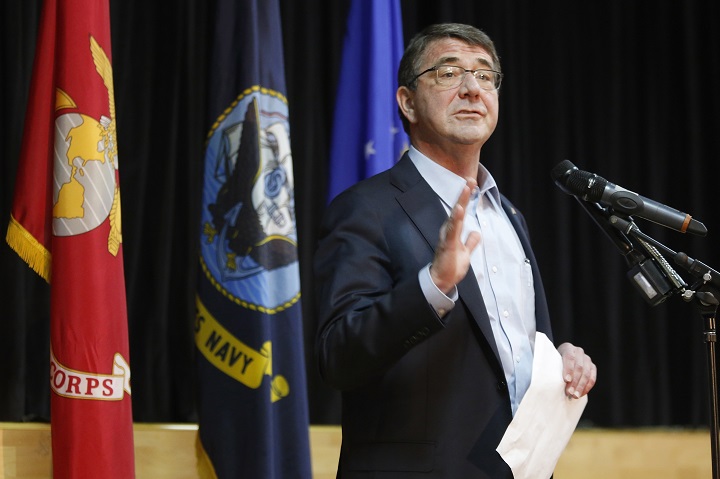CAMP ARIFJAN, Kuwait – U.S. Defence Secretary Ash Carter convened an extraordinary war council Monday on Iraq’s doorstep six days after taking office, gathering military and diplomatic leaders to discuss the Obama administration’s oft-criticized strategy for countering the Islamic State group.

He left suggesting the approach is mostly on track.
“The discussion indicated clearly to me that this group (the Islamic State) is hardly invincible,” Carter told reporters after six hours of closed-door talks with the officials he dubbed “Team America.”
He gave no indication that he that he thinks the strategy needs an overhaul.
“Our discussion this afternoon affirmed the seriousness and the complexity of the threat posed by ISIL, especially in an interconnected and networked world,” he said, using an alternate acronym for the militants. “Lasting defeat of this brutal group can and will be accomplished.”
Carter said the U.S.-led aerial bombing campaign in Iraq is going well, and he expressed confidence that the U.S. military is well suited to carrying out a longer-term effort to train and equip an opposition rebel force in Syria. He specified two areas for needed improvement in the overall strategy: more creative use of social media to counter ISIL’s messaging campaign, and getting more out of some coalition member countries, which he did not name.
Carter was returning to Washington on Tuesday to meet with President Barack Obama.
- L.A. wildfires: U.S. asks Canada for resources as provinces send aid
- Trump hush money sentencing to go ahead as U.S. Supreme Court rejects delay
- Los Angeles wildfires: Alberta plans to send water bombers, other resources to California
- Ex-FBI informant who fabricated bribery story about Biden, son gets 6 years in prison
The Army general commanding the war effort in Iraq and Syria, meanwhile, told reporters that the Islamic State fighters are “halted, on the defensive” in Iraq and facing a new counterattack by Iraqi forces in Anbar province to retake a town the militants seized earlier this month. Lt. Gen. James L. Terry said he is confident the Iraqi push, dubbed “Lion’s Revenge,” will succeed in retaking the town of al-Baghdadi.

Get daily National news
But Terry said of the Islamic State group, “No doubt, they’re adaptive.”
Carter said he assembled U.S. generals, diplomats and intelligence officials not just to hear the latest on battlefield progress but also to better understand the intellectual underpinnings of Obama’s counter-IS strategy, including the ways military force is supposed to combine with political and economic measures to reverse the Islamic State’s gains and eventually defeat it.
During a brief picture-taking session as the talks began, Carter said he needs to better understand what he called the “very complicated” problem of an Islamic extremist group “spreading echoes and reflections around the world.” He added, “It is a problem that has an important military dimension, but it’s not a purely military problem — it’s a politico-military problem.”
Seated around a large T-shaped table were about 25 senior officials, including Gen. Lloyd Austin, head of the military’s Central Command; presidential envoys John Allen and Brett McGurk; the commanders of U.S. forces in Europe and Africa, and U.S. ambassadors summoned from Jordan, Kuwait, Saudi Arabia, Egypt and other Arab nations with a stake in the outcome of the fight against the Islamic State.
“This is Team America,” he said.
The gathering was a highly unusual way for a Pentagon chief to begin his tenure. Aides said participants were told in advance to leave their usual talking points home and be prepared for a freewheeling discussion.
Among other key participants were Army Gen. Joseph L. Votel, commander of U.S. Special Operations Command, and Lt. Gen. Michael Nagata, head of the U.S. program to train and equip a moderate rebel force in Syria. Several of Carter’s top Pentagon aides also attended.
In remarks to troops at Camp Arifjan before the conference began, Carter said the key to success against IS is ensuring that the countries threatened by the group can preserve the gains achieved by the U.S.-led military campaign.
“We will deliver lasting defeat, make no doubt,” Carter said, adding, “It needs to be a lasting defeat.”
The meeting was convened against the backdrop of heavy criticism, mostly by Republicans, of Obama’s strategy for countering Islamic extremism.
It also coincides with the administration’s request to Congress for a new authorization to use military force against the Islamic State group, and comes on the heels of last week’s White House summit on violent extremism.
Carter decided not to visit Baghdad on his first overseas trip. He told reporters he intends to make an Iraq visit sometime in the future. Carter spent Saturday and Sunday in Afghanistan.
In Kandahar, Afghanistan on Sunday, Carter told reporters that he believes the U.S. must rethink its approach to countering terrorism, partly in light of the Islamic State group’s emergence.
“The ways and means of terrorism changed over time and it makes sense to take account of that – that applies here, and it doesn’t apply only here” in Afghanistan, he added. He did not discuss in detail the ways in which he thinks the U.S. should adapt its counterterrorism strategy.






Comments